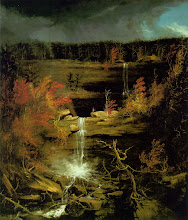Summary:
My initial summary was a page and a half long. This is my summary of my summary:
During the revolutionary period of the late eighteenth century, Schiller describes man as between extremes: barbarity (lower classes) and lethargy (upper classes). Schiller notes that the Greeks represent the ideal in terms of balancing heart (soul?) and mind. When faced with these opposing forces, can the State in such flux attain the harmony achieved by the Greeks? Schiller says it can if enobled by art and beauty, which temper the extremes by "remov[ing] the opposition" (27). When our culture develops that ability to "enjoy the beautiful without desiring it," the Greek ideal of harmony will govern (44,43).
Assumed Values:
Two opposing factions exist. Are there really only two?
Greeks Rule - the idea that the Greeks achieved the ideal (though no mention of slavery)
Lower classes barbaric; Upper classes lethargic
Love = male + female
New Values:
Male love not harmonious
State can be ruled by "aesthetics" like beauty
Greeks as ideal "forms" to modern age
Questions:
Specific question regarding page 35 (Part V Letter XXIII)
I didn't understand the part about passive or active determination. How does it help a person become aesthetic?
Where did the Greek concept of male love go? Did Western culture become more homophobic as Christianity developed or was it more complicated than that?
It's interesting how slavery existed so invisibly in both the Greek and the European/American culture during these periods where such lofty ideals were discussed. This omission was present in the American novel Macaria by Augusta Jane Evans as well. In the novel, written and set at the start of the American Civil War, Evans does not mention slaves at all except when speaking of the South's "bondage" to "Lincolndom."
Links:
To Schiller, Greek model becomes a Platonic "form" to modern cultures although Schiller avoids the male love so central to the Greeks.
Socrates via Plato describes love as the "mean"between extremes. For Schiller, beauty is the mean.
I am continually reminded of Sense and Sensibility by Jane Austen. Her title and book suggest both are necessary. Marianne lacks Elinor's sense while Elinor needs to confide her emotions more to her sister. In addition, Romeo and Juliet also keeps coming to mind in terms of this same imbalance, although I'd add more layers to the imbalance. Like in the revolutionary period of Schiller, Verona's upper classes fail to represent the ideal (and fail to exert any control), leading to a world dominated by violence and emotion.
Subscribe to:
Post Comments (Atom)
.jpg)
.jpg)
.jpg)
No comments:
Post a Comment